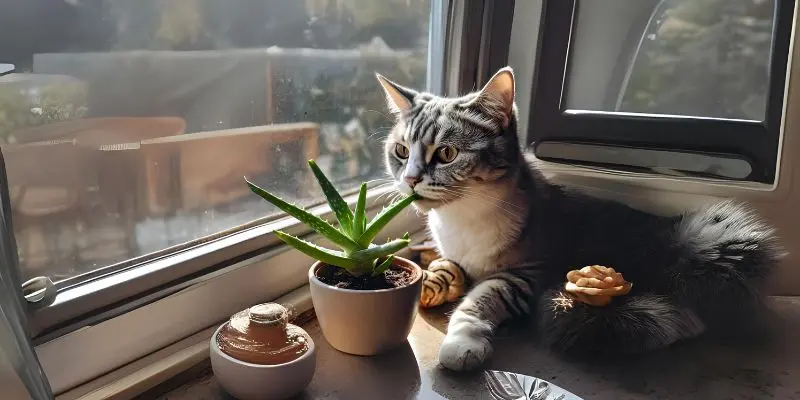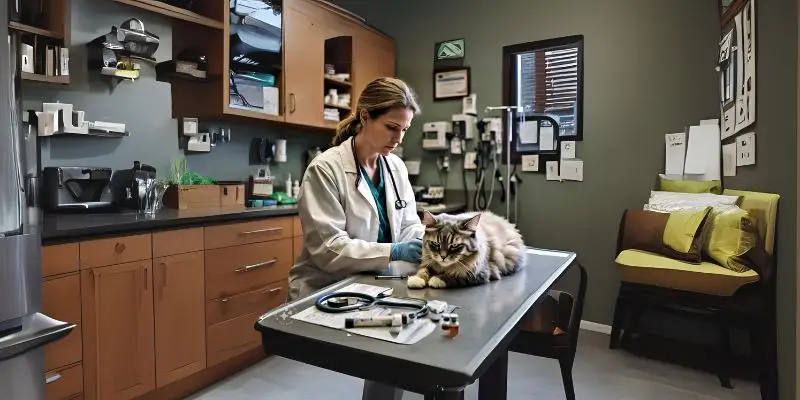Is aloe vera toxic to cats? How can it kill your cute kitty?
Updated: 28 Oct 2024
95
Unseen danger of aloe vera, protect your furry friend.
Hey guys! I know aloe vera offers a lot of benefits for our face and health. But do you know aloe vera is toxic to cats? It can harm your furry friend badly.
According to scientists, aloe vera has some of the toxic properties that may harm your cute kitty by causing vomiting, diarrhea, and dehydration.
And do you know some research on aloe vera says the added consumption of aloe plants can even kill both humans and animals?
So guys, that’s the reason why I edited this whole article. This guide will help you learn how aloe vera is toxic to cats. And how can you get your cat diagnosed and treated properly?
Is aloe vera toxic to cats?

Yes, aloe vera is toxic to cats. Aloe vera contains saponin and anthraquinones that may cause vomiting, diarrhea, nausea, and even dehydration if not treated earlier.
And do you know a 2016 study on aloe vera says aloe vera has the ability to lower blood sugar levels. If your cat eats too much aloe plant, it may lower your cat’s sugar level and can lead him to coma or even death.
If you think your cat has eaten aloe vera, the following symptoms will appear.
- Vomiting
- Diarrhea
- Lethargy
- Change in urine color (mostly red)
- Depression
- Abdominal pain
- Tremors (in some cases)
- Reduced appetite
And guys, do you know aloe vera is also toxic to dogs? Here I explained how aloe vera is toxic to dogs and how you can overcome this issue.
Diagnosis for aloe vera toxin in your cat.
If you think your cat’s health is bad due to aloe vera toxicity, bring him/her to your nearby veterinarian as soon as possible.
Make sure you come with all information about your cat, including how much aloe is eaten, previous health status, and irregular behaviors.

Your veterinarian will conduct a complete physical health examination of your cat, including body temperature, sugar levels, heart rate, and many more.
Your vet may also suggest lab tests such as urine tests, complete blood counts, x-rays, and CT scans for checking existing parts of the aloe vera plant in your cat’s digestive system.
If you have unfortunately administered aloe vera to your cute cat for health benefits, make sure to inform your vet. This will help him in making the right decisions. Here is how your vet will start treating your kitty.
Treatment.
Once the diagnosis is completed, your vet will start the decontamination process or gastric lavage to get rid of all existing parts of aloe vera from your cat’s digestive system.
After that, your vet may give your cat activated charcoal to neutralize all existing toxins in his/her body. The neutralized toxins will be discharged easily by the cat’s digestive system.
If your cat has been dehydrated due to excessive diarrhea and vomiting, the vet may also give your kitty some intravenous fluids to hydrate him.
And if your cat is facing difficulties in breathing during treatment, the oxygen therapy process will also be started to increase the oxygen level in his/her body.
Recovery of aloe vera toxins in cats.
The recovery time for aloe vera toxicity is dependent on two factors:
- How much has your kitty eaten aloe vera?
- And how long did it take you to bring him to your vet?
If aloe vera toxicity has damaged his organ tissues, it will take longer to recover and will also be difficult. You will need to fix appointments with the vet on a daily or weekly basis. Here are some questions that mostly people ask about the aloe toxicity for cats.
FAQs
Is the aloe vera plant poisonous to cats?
Yes, aloe vera plants are poisonous to cats. Aloe vera contains saponins and anthraquinones that may cause vomiting, diarrhea, nausea, and even dehydration in your cat. Scientists say aloe vera has the ability to lower blood sugar levels. So if your cat eats too much aloe vera, it can cause coma and even diarrhea.
Is aloe bad for cats?
Yes, aloe vera is bad for cats. It can cause vomiting, diarrhea, dehydration, and even coma if eaten too much. Sometimes high doses of aloe vera may also lead your cat to fatal issues.
Please Write Your Comments